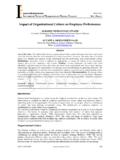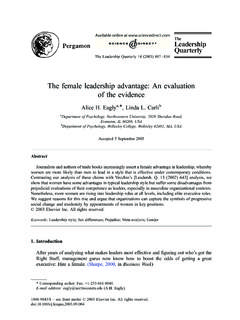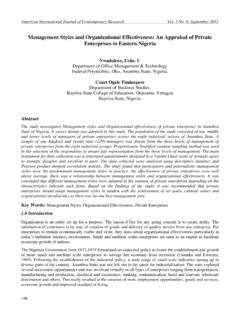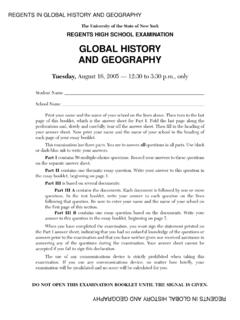Transcription of Transformational vs. Transactional Leadership …
1 ISSN: 2306-9007 Odumeru & Ifeanyi (2013) 355 Transformational vs. Transactional Leadership Theories: Evidence in Literature ODUMERU, JAMES A Lecturer, Department of Banking & Finance, Osun State College of Technology, Nigeria Email: IFEANYI GEORGE OGBONNA Department of Business Administration and Management, Yaba College of Technology, Lagos, Nigeria. Email: Abstract Transactional and Transformational Leadership styles have attracted the interest of many researchers in recent time. While some believe that they are the same, others believe they are different. This paper gives an introductory perspective into the the difference between Transformational and transactionary Leadership drawing from evidence in literature.
2 The paper concludes that although they are conceptually different, some elements of transactionary Leadership exists in Transformational Leadership . Keywords: Leadership , Transactional Leadership , Transformational Leadership , Charismatic Leadership . Introduction Leadership is perhaps one of the most important aspects of management (Weihrich, et al, 2008). This is because Leadership is a major factor which contributes immensely to the general wellbeing of organisations and nations. Organisations such as General Electric and Chrysler had been turned around from the brink of bankruptcy to become two of the world s most profitable organisations through the effective Leadership of Jack Welch and Lee Iacocca (Robbins & Coulter, 2007).
3 Great nations like the United State of America, Britain, France and India are some of the most prominent nations in the world today on the wings of effective Leadership (Weihrich et al, 2008). This is because leaders in organisations and nations make things happen. This paper defines Leadership as the process of influencing groups to achieve goals, while a leader is someone who can influence others (Cole, 2006; Robbin and Coulter, 2007; Weihrich et al, 2008). Several theories have and are being put forward to explain Leadership effectiveness. Two of the most prominent Leadership theories are Transformational and Transactional Leadership theories.
4 Since the late 1980s, theories of Transformational and charismatic Leadership have been ascendant. Versions of Transformational Leadership have been proposed by several theorists, including Bass (1985, 1996). Although most author agree that Transactional and Transformational Leadership are different in concept and in practice, many authors believe that Transformational Leadership significantly augments Transactional Leadership , resulting in higher levels of individual, group, and organizational performance (Bass & Avolio, 1994; Howell & Avolio, 1993; Lowe et al, 1996). Others believe that Transactional Leadership is a subset of Transformational Leadership (Weihrich et al, 2008).
5 The objective of this paper is to use evidence in literature to give a comparative analysis of the two Leadership styles. The paper will also outline and explain inherent weaknesses of the two styles and proffer areas where modifications are necessary. I June 2013 International Review of Management and Business Research Vol. 2 R M B R ISSN: 2306-9007 Odumeru & Ifeanyi (2013) 356 Transformational Leadership A Transformational leader is a person who stimulates and inspires (transform) followers to achieve extraordinary outcomes (Robbins and Coulter, 2007).
6 He/she pay attention to the concern and developmental needs of individual followers; they change followers awareness of issues by helping them to look at old problems in a new way ; and they are able to arouse, excite and inspire followers to put out extra effort to achieve group goals. Transformational Leadership theory is all about Leadership that creates positive change in the followers whereby they take care of each other's interests and act in the interests of the group as a whole (Warrilow, 2012). The concept of Transformational Leadership was introduced by James Macgregor Burns in 1978 in his descriptive research on political leaders, but its usage has spread into organisational psychology and management with further modifications by Bass and Avalio (Jung & Sosik, 2002).
7 Transformational Leadership enhances the motivation, morale, and performance of followers through a variety of mechanisms. These include connecting the follower's sense of identity and self to the project and the collective identity of the organization; being a role model for followers that inspires them and makes them interested; challenging followers to take greater ownership for their work, and understanding the strengths and weaknesses of followers, so the leader can align followers with tasks that enhance their performance. Warrilow (2012) identified four components of Transformational Leadership style: 1) Charisma or idealised influence: the degree to which the leader behaves in admirable ways and displays convictions and takes stands that cause followers to identify with the leader who has a clear set of values and acts as a role model for the followers.
8 (2) Inspirational motivation: the degree to which the leader articulates a vision that is appeals to and inspires the followers with optimism about future goals, and offers meaning for the current tasks in hand. (3) Intellectual stimulation: the degree to which the leader challenges assumptions, stimulates and encourages creativity in the followers - by providing a framework for followers to see how they connect [to the leader, the organisation, each other, and the goal] they can creatively overcome any obstacles in the way of the mission. (4) Personal and individual attention: the degree to which the leader attends to each individual follower's needs and acts as a mentor or coach and gives respect to and appreciation of the individual's contribution to the team.
9 This fulfils and enhances each individual team members' need for self-fulfilment, and self-worth - and in so doing inspires followers to further achievement and growth Weaknesses of Transformational Leadership Yukl (1999) identified seven major weaknesses of Transformational Leadership . First is the ambiguity underlying its influences and processes. The theory fails to explain the interacting variables between Transformational Leadership and positive work outcomes. The theory would be stronger if the essential influence processes were identified more clearly and used to explain how each type of behaviour affects each type of mediating variable and outcome.
10 Secondly is the overemphasis of the theory on Leadership processes at the dyadic level. The major interest is to explain a leader s direct influence over individual followers, not leader influence on group or organisational processes. Examples of relevant group-level processes include: (1) how well the work is organised to utilise personnel and resources; (2) how well inter-related group activities are coordinated; (3) I June 2013 International Review of Management and Business Research Vol.









